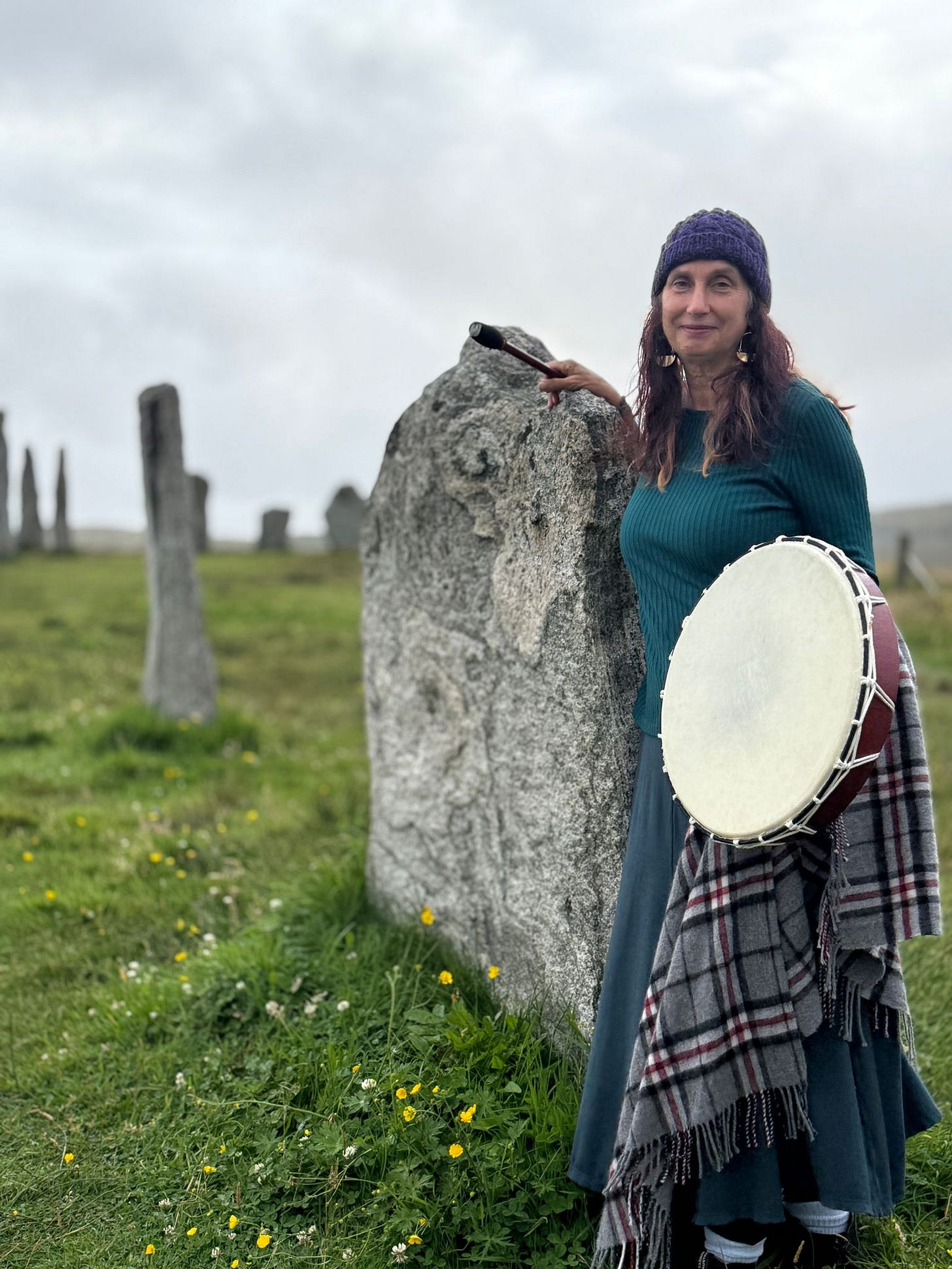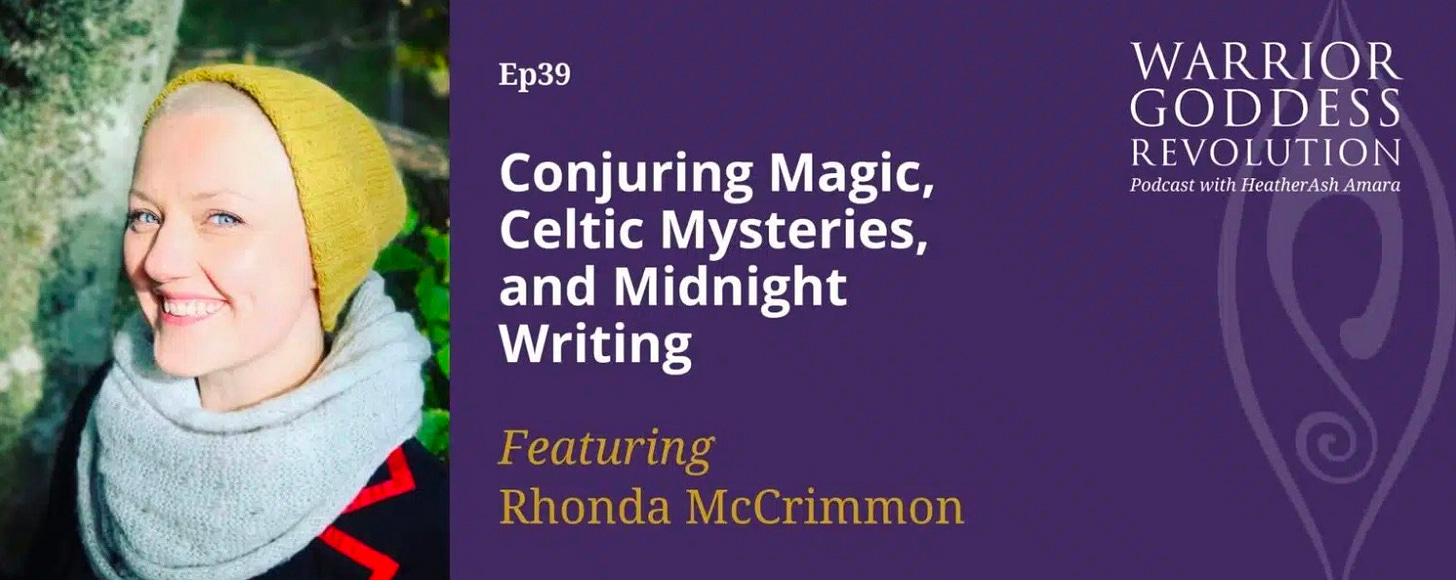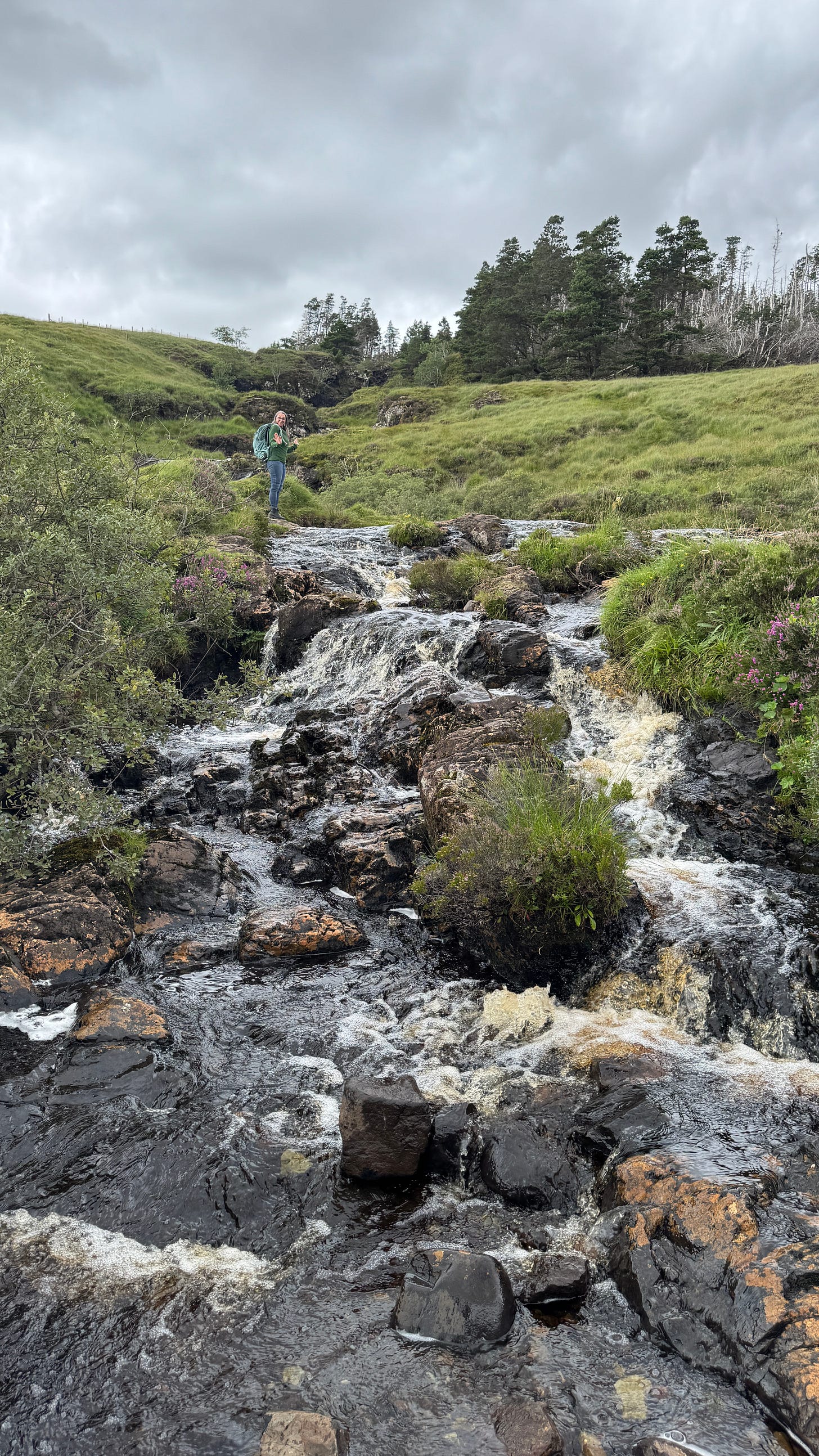Brain breaking & rearranging
Blessed Lammas, blessed re-creation
Greetings from the Outer Hebrides, where we are on day 9 of a 11-day pilgrimage here in Scotland. I’m here with my Scottish friend Rhonda McCrimmon and 16 pilgrims connecting to the land and the ancestors. I’ve been blessed to track my maternal lineage back to Isle of Lewis, and after four years of spending time here I’m grateful to be sharing the wild beauty and wisdom of these lands with others.
We have stayed in castles and yurts, hiked to ancient stones and waterfalls, visited weavers and listed to Gaelic songs in old villages. I’m in my happiest of happy places, my feet on the land of my great great great great grandparents.
Today I’m thinking about summer beginning to ease into autumn here in the northern hemisphere. In many places it still feels like full-on summer; and yet the earth continues its slow revolution around the sun, and each day we tilt slightly away from light and long days, toward increasing night and dropping temperatures.
The endless turning of summer into fall, fall into winter, winter into spring, and spring into summer again, the change in trees and flowers, colors and sounds is something we used to be able to rest into and rely on. Nowadays climate change has shifted the cadence more toward chaos and the unexpected. Hail in June. Atmospheric rivers, uncharted rain and devastating flooding. Fires that eat entire towns and/or hungrily burn for months. Temperatures that are like athletes trying to best themselves.
The elements — air, fire, water, earth —have never been tame or predictable. The elements are not punishing or vindictive; they are simply doing what they do, responding to changing variables of much larger cycles.
Predictable cycles help us make sense of the world and feel a safety of rhythm and flow in our lives. When familiar cycles or patterns get disrupted we can get more afraid and grasp to find a sense of control and order, or we can open wider to listen for how to respond with creativity and skill.
But what happens when you discover the foundational beliefs you’ve built your life on are wrong?
The summer of my 19th year I spend a month traveling in Nepal and India with one paperback book: Dreaming the Dark by Starhawk.
Do you remember the first book that really shifted your reality? Reading Starhawk’s words was a remembering and a homecoming, not just a book. I read it over and over again, underlining whole paragraphs, mouth agape at times. Here was what I had been seeking my entire life without understanding what was missing. Suddenly, the world and my place in it made sense.
For the next five years I read every book I could find on paganism, earth-based spirituality, goddess spirituality, and European shamanism. From Starhawk to Margot Adler, Z Budapest to Merlin Stone, I devoured the teachings. When God Was a Woman. The Spiral Dance. The Cosmic Mother. Women Who Run With the Wolves.
In the late 1980’s and early 1990’s I apprenticed with Vicki Noble, shamanic teacher, scholar and co-creator of The Mother Peace Tarot and Cerridwen Fallingstar, witch and author of The Heart of the Fire. My heart was on fire. I started writing about what I was learning, and then teaching.
At the foundation of what I learned, and taught, was the importance of moving from linear time, control and power over to cyclical time and harmonizing with life and inevitable change. I was devoted to sharing how to respect and honor the four elements of air, fire, water, and earth, the wheel of the year which included the Solstices, Equinoxes, and four cross-quarter days, and the cycles of the moon and their connection to the ancient archetypes of Maiden, Mother, and Crone.
What I didn’t realize was how pieced together and sometimes inaccurate what I was sharing was. And that what we call European shamanism was a partially “borrowed,” most likely from indigenous Lakota tradition.
Must of us are starving for a sense of belonging, a way back to roots that are grounded in connection, an easy pathway to our ancestral (blood or otherwise) beliefs. It is much easier to romanticize that pre-modern people who lived closer to the earth were more spiritual or connected or wise.
The truth is that all of our ancestors were more attuned to the earth and her cycles because they had to be to survive. But we only have fragments of the past. The early Abrahamic religions did a thorough job at destroying much of the wisdom and ways of those who came before them. Or they absorbed and claimed older traditions as their own. There is much paganism and ancient ways woven into all major religions. This is also true in Asia as well. Tibetan Buddhism, for example, sprung out of an older shamanic tradition called Bon.
So much has been lost. So much is being discovered. The key is not to hold tightly, but to allow space for change and new information arising.
I first met Rhonda when my publisher called me and asked me to speak to a possible new author about my experience working with Hierophant Publishing. From the first time Rhonda and I spoke we had mutual respect and love for each other’s path. Rhonda’s mentor at the time had been inspired by my book Warrior Goddess Training; when I visited Rhonda’s Tik Tok profile I was delighted by both her many viral videos and her seeking of the historical truth of “Celtic shamanism” vs what has become popular knowledge that is not necessarily based in fact.
Over the years Sarina (our community development maven and main Warrior Goddess teacher) and me and had numerous conversations about cultural appropriation, European shamanism, Wicca, and earth-based traditions. Sarina had an early sense that some of what we were teaching in Warrior Goddess was not as cut and dry truth as we thought; when we met Rhonda we both started unpacking what we had learned and sorting what was closer to what our Scottish /Irish ancestors believed in.
We must remember that all teachings were once oral, wisdom passed down through storytelling and direct connection with plants, minerals, and elements. The moment something is written down it is compromised at some level because it is no longer in breathing, living relationship with place and people. The few original texts of indigenous ways that survived are filtered through either the narrow Christianized perspective of colonists, missionaries, or archeologists.
In the early 1970’s feminists began to explore and dream into what a pre-patriarchal, community and earth-based way of living would look like. There was a desire to uncover pre-Christian roots and ways. Because so much had been lost there was a good dose of creatively filling in of the many gaps. Things that were only speculative started being held as historical fact. Visions and dreams and hopes started being claimed as ancient tradition. Wishes of what could be start overlaying what actually was.
When I first started realizing that there was a good dose of borrowing from other cultures and calling it traditional European shamanism I felt the ground shake under my feet. I was tempted to turn the other way, to keep the solid base of my spiritual foundation intact. But my decades of work with don Miguel Ruiz and Toltec shamanic practice helped me to turn toward with curiosity and start to question my belief system.
Here is a current example:
There are four quarter festivals in what we call the Wheel of the Year: Summer and Winter Solstice which are the longest and shortest day of the year and Spring and Autumn Equinox which are equal day and equal night.
Lughnasad, also known as Lammas, is one of four cross-quarter festivals. It falls between Summer Solstice and Fall Equinox. Lughnasad marks the first harvest of grain and the turning of the wheel of the year from summer to fall. It falls on August 1st each year.
Wellll…. I just found out a few days ago that I’ve been mispronouncing Lughnasad for 40 years (it is pronounced Lu-na-sa in Gaelic, not Lugh-nas-a), and that in the oldest texts Lughnasad falls on the second new moon after the Summer Solstice, which of course changes every year.
Lammas, (or Loaf Mass day) is the English / Christianized version of Lughnasad, marking the day when the first loaves of bread are blessed, you guessed, on August 1st.
An aside: I think it is fascinating that of all the old pagan holidays that were brought into Christianity — Easter is the only one that retains a moon-based date. Easter is always the first Sunday after the full moon that occurs on or after Spring Equinox.
So what is a girl to do? Do I keep celebrating Lughnasad on August 1st as I’ve been doing most of my life, or do I shift and celebrate this cross-quarter day on the new full moon after the Equinox?
Will the real Lughnasad please stand up?!?
My solution: celebrate both. Keep letting my brain break. Rearrange. Celebrate some more.
There is not a right answer. For me what is most important is to not get caught in dogma, to not try and prove I’m right and someone else is wrong. This is what I appreciate about Rhonda; she keeps reading and researching and learning without making anyone wrong and becoming dogmatic of what is “right.”
Now when I teach about the Wheel of the Year, the elements, and the earth-based spiritual traditions of Europe I remind everyone that we are re-creating something that was absorbed by a dominating religion that did its best to wipe out the old ways. Just like archeology is discovering new things each day about our human past and challenging our perspectives, let us be flexible to keep learning and growing as new information is uncovered.
The research and readings I did when I was in my 20’s are one stop on a river that continues to flow.
May we learn from the young ones and creatives, the scholars and seekers, the explorers and disrupters. May we also slow down and bend down low to listen to the land and the elders, the ancestors and the invisible realms.
Blessed Lughnasad, dear ones! Honor whatever you are harvesting in these precious days.
A few Resources for you…
Here is a podcast Rhonda and I did a few months ago:
https://warriorgoddess.com/podcast
And a few articles; one from Starhawk who continues to inspire me with her blend of spirituality, activism, and devotion to permaculture and healing the earth:
Making Lammas Bread:
Ancient Scottish fermentation:
Much love!
Ash








